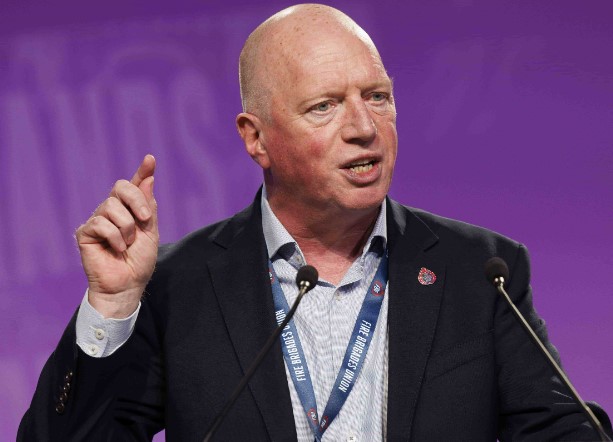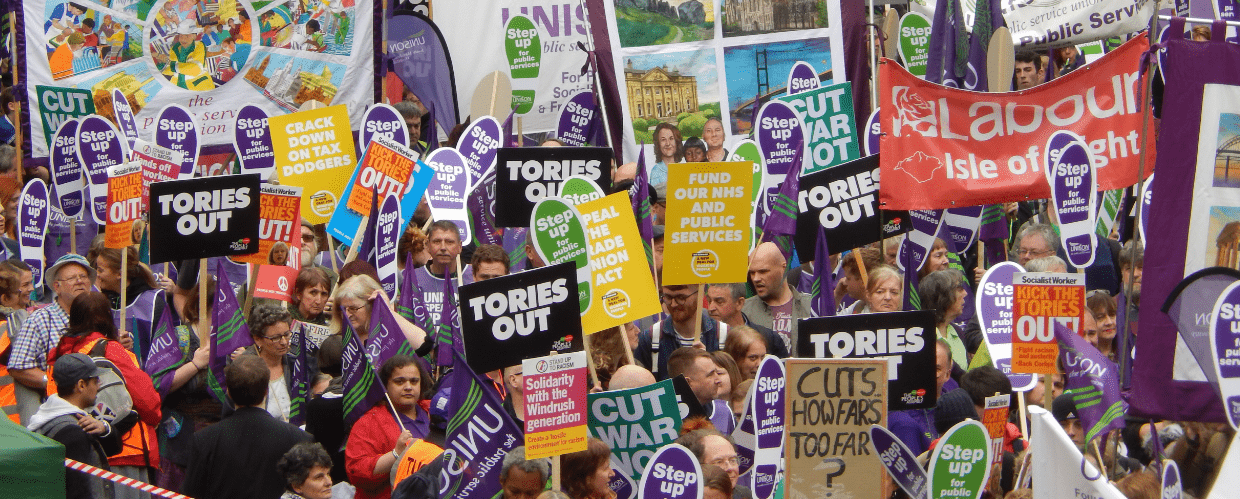The special conference of the TUC last weekend reaffirmed its previous decision to opposed the Strikes (Minimum Service Levels) Act, which comes into force in January. A General Council statement agreed at the conference makes clear the opposition of the entire trade union movement to the new government regulations that effectively remove the right to strike for many workers.
As the TUC statement makes clear, the UK “already has some of the most restrictive trade union laws in Europe”, but the new Act gives employers powers to effectively ban strikes in some sectors. Employers facing strike action and who issue a notice under the Act, can identify which workers they wish to continue working – crossing the picket lines of their own trade unions – to maintain a ‘minimum service level’. Any workers who refuse to comply can be sacked, without the right of appeal to an industrial tribunal.
The trade unions themselves are drawn into the process, to police their own strikes. As the TUC statement explains, “The legislation seeks to regulate the content of union communications with their members, requires unions to police their own strikes, and asks unions to take on the role of employers, by informing their members both that they must attend work, and what work they are expected to do”.
Unions that refuse to send compliance notices to their members may face fines and financial redress from an employer. If the provisions of this Act are implemented, it would take UK trade union rights back more than a hundred and twenty years to the Taff Vale Judgement.
“Minimum Service Levels’ may involve more than 40% of workers
The draconian character of the Act can be seen by the research undertaken by the TUC, some of which is mentioned in their statement. “Ministers at the Department for Education have suggested that an education minimum service level would apply to 74 per cent of pupils”, which means, in effect, that the majority of teaching and education staff could be denied the right to strike.
A similar argument can be put for passenger rail transport, where the the TUC points out that the provision of a “40 per cent minimum” service would require far more than 40 per cent of the rail company staff, again potentially making striking illegal for most railway workers. Interviewed in the Guardian on December 3, Matt Wrack, FBU General Secretary, made the point that “100% of firefighters might be issued with work notices after they had voted to strike”.
Where Left Horizons differs with the TUC statement is that the latter leans towards the idea – which is completely utopian – that employers and trade union members are somehow on the same side. It may be true that many employers see the legislation as completely unnecessary and even disruptive to industrial relations, but to suggest that the Act will “poison” relations between workers and bosses runs in the face of the facts. Most strikes take place a last resort against recalcitrant bosses (or government, or local authorities) who are simply not prepared to maintain, let alone raise the working conditions or wages of workers.
In his interview, Matt Wrack was much more forthright than the TUC. “The FBU and other unions”, he said, “will not accept this attack on working people by this government led by multimillionaires and which ruthlessly serves the interests of the billionaires and bosses.” That is really what this Act is about, not “poisoning relations.”
A report last week noted that in the month up to the middle of November, nearly one ten households were unable to pay a major bill. The cuts in living standards over the past few years – against which the trade union movement have been forced into struggle – have been the steepest in generations. The relationship between employers and trade unions was “poisoned” long before this Act came to the House of Commons. It is precisely the aim of this Act to stymie the efforts of the trade unions to defend of their members.
Welsh and Scottish First Ministers will not use the Act
Major Labour figures in local and national governments have been clear that they will not seek to use any of the regulations of the bill. Labour metro mayors and Welsh First Minister, Mark Drakeford, have said that they will not use any of the provisions of the Act. Neither will the SNP First Minister in Scotland. This is to be welcomed, as is the commitment of the Labour Front bench to repeal the Act within the “first 100 days” of office.

But, in the meantime, it is possible that rogue employers or the government may use the bill against strikes early in the New Year. The TUC statement states that “In every workplace where employers attempt to deploy and impose these draconian rules they can expect the trade union movement to respond with a show of force and solidarity for any workers affected”.
The statement reasserted the position taken by the TUC Special conference last September, that “we have no choice but to build mass opposition to the MSLs laws, up to and including a strategy of non-compliance and non-cooperation to make them unworkable, including industrial action” and that “we must use all means necessary to defeat the unjust MSLs laws.” Saturday’s conference also recommitted the TUC to “100 per cent solidarity with any trade unions attacked under these MSL laws”.
The second part of the TUC statement outlined some of the measures the TUC will initiate or coordinate to oppose any instance where the Act is deployed. The key commitment in this entire section was a call on constituent member unions to “Refuse to tell our members to cross a picket line”.
The TUC is organising a national demonstration in Cheltenham on January 27, to mark the struggle for trade union rights at the government cyber-security centre at GCHQ. But they have also given a commitment to call “an urgent demonstration in the event a work notice is deployed and a union or worker is sanctioned in relation to a work notice” and, furthermore, to “coordinate communications and campaigning activity across the trade union movement”.
In her article in the Guardian, the day before the special TUC conference, Sharon Graham, General Secretary of UNITE, wrote (correctly) that the trade union movement cannot just wait for Labour to repeal the legislation. Apart from anything else, as she pointed out, Keir Starmer’s disgraceful comments about Margaret Thatcher recently “might make you wonder”.
Sharon Graham also pointed out that the trade unions may have to address a situation where a union is forced to tell its own members to cross a picket line. “We will have to be prepared,” shewrote, “for self-reliance, for practical solidarity. Because in the coming months it will be what the unions and our members do that matters, not the words of some judge or politician”.
Militant and coordinated industrial action.
She referenced the Labour councillors in East London who, in 1921 went to prison rather than imposed financial hardships on local people, citing the now famous phrase, “It is better to break the law than to break the poor.”
“Unions, too, must be prepared to back their members in the face of unjust laws. At Unite’s conference in July, we reaffirmed the rulebook change that the union is not bound to always act inside the law”
We should never underestimate the importance of the trade union “machine” and its network of full-time organisers, regional and national conferences, meetings and schools. They are there to serve the members and to help to organise them. There are questions that need to be discussed about how responsive and democratic this machinery is, and whether or not trade unions are really member-led. But that important issue is outside the scope of this article. What is important to remember is that the trade unions’ membership is more important and fundamental than the superstructure that rises above it.
The Tories may threaten the trade union apparatus with legislation, but they cannot remove the will and the willingness of millions of workers to organise themselves into unions. It is ultimately by an appeal and by the mobilisation of the members, that the trade unions will be able to successfully defend their rights. We cannot add any more to the words we wrote in our editorial in September:
“Militant and coordinated industrial action could crush the MSL Act and stop it dead in its tracks. But the decisive factor in whether or not it is deployed and implemented is that of leadership. No-one else will do it for them: the trade union and TUC tops have a responsibility to provide it”.



